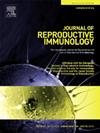T lymphocytes in human milk: Their role in immune system maturation through maternal microchimerism
IF 2.9
3区 医学
Q3 IMMUNOLOGY
引用次数: 0
Abstract
Breastfeeding promotes the trafficking of immune cells and soluble factors from the mother to the neonate during lactation, resulting in maternal microchimerism. Human milk is abundant in T lymphocytes, but little is known about their priming and actions in neonatal mucosal tissues and their role in conferring immune tolerance in early life. This review summarises recent findings on the characteristics of human milk T cells compared to their counterparts in maternal and neonatal blood. We discuss how bioactive components of human milk, such as cytokines, hormones, and miRNA, may modulate the immune suppressive function of this cell subset. We shed light on the presence and possible functions of regulatory T cells (Tregs) in the breastfeeding triad of mother, human milk, and neonate, and how this subset of T lymphocytes may contribute to the prevention of immune pathologies, such as allergies and autoimmune diseases, later in life through human milk-induced maternal microchimerism in the newborn.
母乳中的T淋巴细胞:它们通过母体微嵌合在免疫系统成熟中的作用
母乳喂养促进了哺乳期间免疫细胞和可溶性因子从母体向新生儿的运输,导致母体微嵌合。母乳中含有丰富的T淋巴细胞,但人们对它们在新生儿粘膜组织中的启动和作用以及它们在生命早期赋予免疫耐受中的作用知之甚少。本文综述了人乳T细胞与母体和新生儿血液中T细胞特征的最新发现。我们讨论了人乳中的生物活性成分,如细胞因子、激素和miRNA,如何调节这种细胞亚群的免疫抑制功能。我们阐明了调节性T细胞(Tregs)在母乳喂养母体、母乳和新生儿中的存在和可能的功能,以及这一T淋巴细胞亚群如何通过母乳诱导的新生儿母体微嵌合来预防免疫病理,如过敏和自身免疫性疾病。
本文章由计算机程序翻译,如有差异,请以英文原文为准。
求助全文
约1分钟内获得全文
求助全文
来源期刊
CiteScore
6.30
自引率
5.90%
发文量
162
审稿时长
10.6 weeks
期刊介绍:
Affiliated with the European Society of Reproductive Immunology and with the International Society for Immunology of Reproduction
The aim of the Journal of Reproductive Immunology is to provide the critical forum for the dissemination of results from high quality research in all aspects of experimental, animal and clinical reproductive immunobiology.
This encompasses normal and pathological processes of:
* Male and Female Reproductive Tracts
* Gametogenesis and Embryogenesis
* Implantation and Placental Development
* Gestation and Parturition
* Mammary Gland and Lactation.

 求助内容:
求助内容: 应助结果提醒方式:
应助结果提醒方式:


